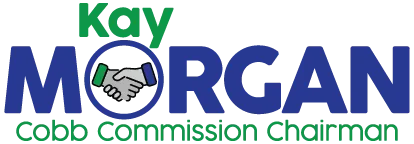Blog

Why Workforce Development Matters: Securing Our Economic Future
Workforce development is the unsung hero of our economy. It's the key to unlocking the potential of our people and ensuring a brighter future for all. In a world where technology is advancing at breakneck speed and the job market constantly evolves, investing in our Cobb County workforce has never been more crucial.
Here's the secret: workforce development is really about building a team of superheroes. This means people who can take on any challenge, learn any skill, and come out on top. It's about creating a workforce that's skilled, resilient, adaptable, and ready for anything.
The Importance of Workforce Development in Today's Economy
In today's rapidly evolving global economy, the success and competitiveness of our Cobb County economy are heavily reliant on a skilled and adaptable workforce. Thus, workforce development programs play a pivotal role in shaping our community's economic landscape.
Upskilling programs sharpen your talents and know-how, keeping you ahead of the curve in a constantly changing job market.
Bridging the Skills Gap
The skills gap is one of the biggest challenges facing today's workforce. As industries and technologies continue to evolve, there's a growing mismatch between the skills possessed by the available workforce and the skills required by employers to fill specific job roles effectively.
Businesses face a significant problem: they can't find workers with the right skills. According to McKinsey, 40% of American companies are struggling to fill even entry-level positions. That's where workforce development programs come in – they're essential for closing the skills gap.
As the job market evolves, the demand for highly skilled workers who can adapt to new challenges grows. These initiatives offer people the chance to gain relevant training and education, aligning their skills with what employers need. By emphasizing both technical know-how and interpersonal abilities, these programs help participants develop the competencies that industries are looking for in today's dynamic workplace.
Boosting Productivity and Competitiveness
Workforce development programs are the secret weapon for boosting our competitiveness. They don't just bridge the skills gap—they create a workforce ready for anything, making the region a magnet for businesses that want the best.
When skilled workers flock to an area, it's like a domino effect. New businesses pop up left and right while existing ones expand faster than you can say "job growth." These talented folks are the secret sauce behind groundbreaking innovations, embracing the latest tech and cooking up fresh products and services that put their regions on the map as industry trailblazers.
Driving Economic Growth and Resilience
Workforce development programs enhance competitiveness and foster economic resilience. In a fast-paced job market, individuals need to stay relevant and adaptable to remain employable. Continuously learning and upskilling is a surefire way for individuals to stay valuable to their employers, no matter what the economy throws their way.
Communities that invest in workforce development are setting themselves up for success. They're building a workforce that's well-trained, versatile, and ready to pivot at a moment's notice to meet the demands of emerging industries or adapt to changes in the labor market. The result? A community that's better equipped to handle economic downturns.
Critical Elements of Effective Workforce Development Programs
Want to create a workforce development program that truly makes a difference? It's not as easy as it sounds. You'll need to navigate a complex web of factors, from identifying the most pressing skill gaps to designing training that engages and inspires participants. But with the right approach, the payoff can be huge.
Due to the diverse and dynamic nature of many industries, these programs often struggle to be responsive enough to address evolving industry needs. Furthermore, fostering the needed partnerships between educational institutions, employers, and government entities can be complex, as their differing priorities and approaches need to be harmonized for the program's success.
Targeted Job Training and Skill Development
One key element of effective workforce development programs is targeted job training and skill development. These programs should focus on providing individuals with the specific skills and knowledge required to succeed in their chosen careers.
This can include technical skills, soft skills, and industry-specific knowledge. By aligning training with the needs of employers and industries, workforce development programs can help bridge the skills gap and prepare individuals for in-demand jobs.
Collaboration with Employers and Industry
Another critical component of successful workforce development programs is collaboration with employers and industry. These partnerships ensure that training programs are relevant and responsive to the needs of the job market.
When employers share their insights on essential skills and competencies, it can have a big impact on job training programs. And that's not all—teaming up with industry partners can also lead to amazing internships and apprenticeships that give participants the chance to learn on the job.
Comprehensive Support Services
Effective workforce development programs also provide comprehensive support services to ensure participants can complete the program and secure employment. This may include assistance with transportation, childcare, housing, and other basic needs.
Workforce development programs don't just identify roadblocks—they provide the support and resources needed to overcome them and emerge victorious.
Continuous Evaluation and Improvement
Finally, effective workforce development programs continuously evaluate their outcomes and make improvements based on data and feedback from participants, employers, and other stakeholders. This ensures the program remains relevant and responsive to the changing needs of the labor market.
By regularly assessing program effectiveness and making data-driven decisions, workforce development programs can optimize their impact and deliver better results for participants and employers.
Workforce Development: Prioritizing Human Development and Potential
Workforce development programs are all about believing in people and helping them reach their full potential. When we focus on developing individuals, we're not just changing lives—we're also making our communities and economy stronger.
When businesses focus on people first, good things happen - for employees, companies, and even the communities they serve. Let's explore how workforce development prioritizes human development and potential.
Investing in Employees' Personal and Professional Growth
Picture this: a workplace that genuinely cares about your growth and success. That's precisely what development programs aim to create. By giving you access to ongoing training and skill development, these programs help you unlock your full potential and make big moves in your career.
This investment benefits the individual and the organization, as employees with enhanced skills and knowledge are more productive, innovative, and engaged in their work.
Fostering a Culture of Continuous Learning
The best workforce development programs make lifelong learning a core part of an organization's identity. By providing resources and incentives for continuous education and training, these initiatives cultivate an atmosphere that values the pursuit of knowledge and celebrates the acquisition of new abilities.
Picture this: a workplace where everyone's constantly growing, like chameleons, adapting to new challenges in the job market. But it's not just about survival – it's about thriving. When minds continuously expand, innovation is born, and creativity flourishes like a well-watered garden.
Enhancing Employee Engagement and Morale
Investing in employee growth through workforce development programs boosts employee satisfaction and dedication. When staff members know their company values them enough to support their professional journey, they're more inclined to bring their A-game every day.
Want to know the secret sauce to a productive, engaged workforce? It's simple: invest in their growth and development. When you prioritize human development through workforce development programs, you're not just teaching them new skills – you're showing them that you value their potential and are committed to helping them succeed. And when your employees feel supported and empowered, they'll go above and beyond to drive your business forward.
Key Takeaway:
Workforce development is vital in tackling today's skills gap, boosting productivity, and driving economic growth. By offering targeted training and fostering collaboration between industries and educators, these programs help people stay competitive in a fast-paced market.
Adapting Workforce Development to the Changing Job Market
The job market is constantly changing. Industries rise and fall, new technologies emerge, and the skills required to succeed evolve at a breakneck pace. This dynamic landscape demands adaptability from both workers and the programs designed to support them. Workforce development initiatives must keep their finger on the pulse of these changes to remain relevant and practical.
Identifying Emerging Skills and Industry Trends
I've seen firsthand how quickly the demands of the job market can shift. It's not enough to train workers for the jobs of today; we must anticipate the needs of tomorrow. This requires close collaboration with employers, industry associations, and educational institutions.
By fostering these partnerships, we can gain valuable insights into the specific skills and knowledge most will be in demand in the coming years. Armed with this information, we can design training programs that truly prepare workers for the future.
Designing Flexible and Responsive Programs
But it's not just about predicting the future; it's also about being nimble in the present. Workforce development programs must be designed with flexibility in mind. Gone are the days of one-size-fits-all training. Today's workers need access to programs that can be customized to their individual needs and goals.
Modular courses, online learning platforms, and other innovative approaches allow for this level of adaptability. I remember one program we developed that allowed participants to choose from a menu of skill-building modules. They could mix and match based on their career aspirations and existing knowledge gaps. The results were impressive – higher engagement, better completion rates, and more successful job placements.
Leveraging Technology for Accessible and Personalized Learning
Technology has been a game-changer in this regard. Online courses, virtual reality simulations, and mobile learning apps have made training more accessible than ever before. Workers are no longer constrained by geography or scheduling conflicts. They can access the resources they need to build new skills anytime, anywhere.
But it's not just about convenience; technology also enables a level of personalization that was once unthinkable. Adaptive learning software can adjust course content based on a learner's performance, ensuring they get the support they need to master new concepts. Imagine a future where every worker has a virtual career coach in their pocket, guiding them through a customized learning journey. That's the power of technology in workforce development.
The Pivotal Role of Workforce Development in Economic Development
When we talk about workforce development, we often focus on the benefits to individual workers. But the impact goes far beyond that. I argue that workforce development is one of the most powerful tools for economic growth and prosperity. A skilled and adaptable workforce is the foundation upon which businesses are built.
Without access to talent, companies struggle to innovate, grow, and compete in an increasingly global marketplace. That's why workforce development programs are so crucial. By providing workers with the skills and knowledge they need to succeed, these initiatives play a pivotal role in attracting and retaining businesses.
Attracting and Retaining Businesses
I've seen this play out time and again in my work with economic development organizations. When a region invests in its workforce, businesses take notice. They see a community that is committed to providing a pipeline of skilled talent. They see an opportunity to tap into a pool of workers who can help them achieve their goals. And it's not just about attracting new businesses; it's also about retaining the ones you have. When companies know they can find the talent they need locally, they're more likely to stay put and expand their operations.
Stimulating Job Creation and Entrepreneurship
However, workforce development programs don't just support existing businesses; they also stimulate job creation and entrepreneurship. By equipping individuals with the skills and knowledge needed to start their ventures, these programs can help diversify local economies and create new employment opportunities.
I think of the story of Maria, a participant in one of our entrepreneurship training programs. She had always dreamed of starting her own catering business but lacked the know-how to make it happen. Through the program, she gained the business planning, marketing, and financial management skills she needed to turn her passion into a thriving enterprise. Today, she employs a team of five and is a fixture at local events and festivals.
Strengthening Local and Regional Economies
Stories like Maria's are a testament to the ripple effect that workforce development can have on local and regional economies. When individuals have the skills and support they need to succeed, entire communities benefit. But it's not just about individual success stories. Workforce development also plays a crucial role in building regional resilience.
In times of economic disruption – whether a significant employer leaving town or a global pandemic – a skilled and adaptable workforce is essential for weathering the storm. By investing in continuous learning and upskilling, regions can create a buffer against economic shocks and position themselves for long-term prosperity.
Conclusion
The importance of workforce development for Cobb County cannot be overstated. It's not just about filling job openings or boosting productivity - it's about investing in our people and our future. By prioritizing workforce development, we can bridge the skills gap, drive innovation, and create a more inclusive and equitable economy.
Picture this: businesses, schools, and the government working together to build training programs tailored to the needs of the job market. We're talking about giving people the power to succeed, regardless of where they come from or what challenges they've encountered along the way.
Sure, the future is a bit of a mystery, but here's what we know for sure: workforce development is our secret weapon for a booming economy. When we give our workers the skills they need to crush it, we're not just helping them—we're building a better future for all of us.
Want to learn more right away? Subscribe today and we'll send you a series of emails about Kay, why she's running, and how you'll get the Cobb County you deserve...
Kay for Cobb Chair
1635 Old Hwy 41 NW
Suite 112-230
Kennesaw, GA 30152
(404) 905-1130
info@kayforcobbchair.com

PAID FOR BY KAY FOR COBB CHAIR
